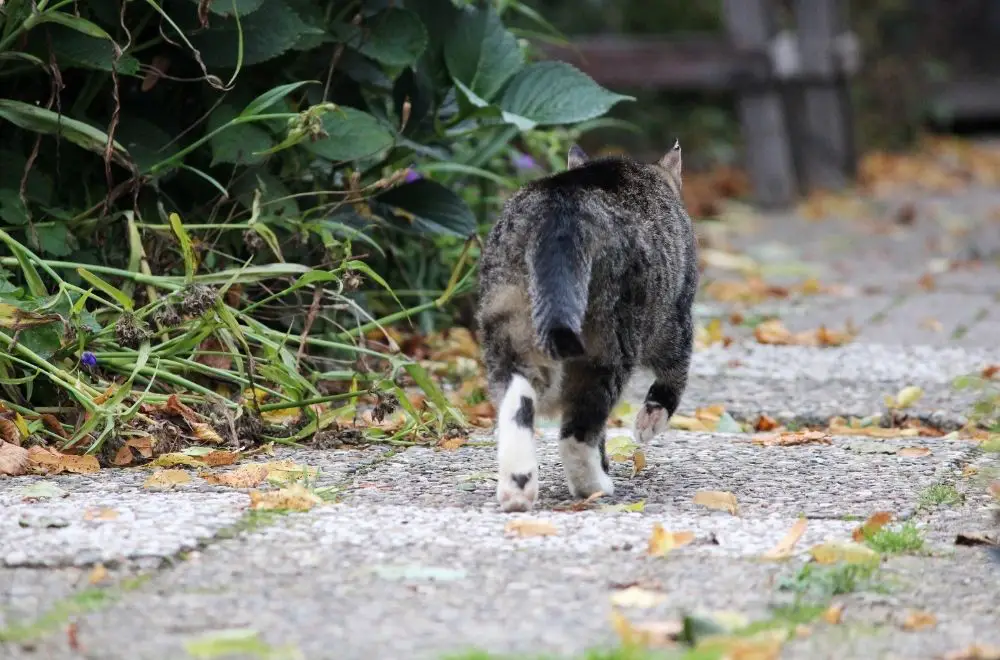Many cats are like flakey friends: one moment they’re all over you, and the next thing you know they seem to be ignoring your very existence. In more extreme cases, a cat can suddenly disappear, never to return again. What could be the possible reasons for such an unexpected departure?
The most common reasons why cats abandon their owners are reproduction, prey drive, neglect, and territorial drift. We will now cover each of these in more detail:

1. Reproduction
All sexually active animals have a strong, unconscious drive to produce offspring. This makes sense when you think about it for a second; sex is what ensures the very survival of a species. It is easy to see why nature has hard-coded sexual behavior into the deepest, most primitive parts of the animal brain. These are behaviors that we have very little control over.
So unneutered male cats and unspayed female cats in heat have an enormous urge to find potential mates. During reproductive cycles, such matters can even get top priority over every other basic need. Things like food, water, safety and shelter often become less important than finding a suitable mate.

If your cat does not find a suitable partner in their direct vicinity, they may travel up to several miles away from home. Venturing so far into the unknown brings a whole set of additional risks; your cat could get stuck, injure itself, or even get abducted. But most importantly, the increased distance could easily cause a cat to get lost, as they tend to lose track of the familiar scent that would otherwise guide them back home.
What to do about it
- It is very unwise to let an indoor cat go outside during reproductive cycles, even for just a minute. They will certainly use the opportunity to venture out and find potential mates.
- Desexing your cat is highly recommended! Neutering also has a diminishing effect on aggressive behavior towards other cats.

2. Prey drive
One of the reasons cats enjoy being outside so much is because nature provides plenty of opportunities for a good old hunt. Wild felines survive by hunting live prey, so it should come as no surprise that over thousands of years of evolution, cats have become exceedingly good at killing. In fact, they crave it!
What to do about it
- There is not much you can do to change prey drive. Keep your property clean so as not to attract rats and mice, and play with your cat daily to provide them with enough stimulation.

3. Physical & Emotional neglect
While reproductive cycles and prey drive are inherent to feline biology, a more sinister cause of abandonment by cats is them not being cared for properly. Neglect any animal long enough and the negative emotions like fear and loneliness will start to creep in.
If you fail to provide your pet with food, water, affection or other basic necessities, then you should not be surprised if they get up and leave you someday.
Not every bad owner neglects their pets on purpose though, which is why Catpointers came into existence. With more awareness of the needs and intricacies of felines, more people will be able to properly take care of their cats and prevent abandonment.

What to do about it
- Read up on feline nature and learn about basic needs such as food, stimulation and affection. We have a section for new owners.
- If you’re decided to let your cat roam outdoors, be sure to provide a warm place for them to curl up in during cold winter nights.
4. Territorial Drift
A cat’s territory is the safe haven where it can let its guard down. At the same time, most cats are also somewhat imperialistic (a fancy word for saying they are always looking to expand their territory). This presents problems. The bigger a territory becomes, the more likely it will start to overlap (and thus need to be defended). This can result in fights and nasty injuries.
If you have a dominant cat, you need not worry about them drifting as they would rather perish in a fight than give up their resources. But a less confident cat could easily be intimated and drift away from its own territory as a result. It might relocate in the neighbor’s yard or even further away from home.

How to prevent a cat from running away
- The most effective solution is to keep your cat indoors at all times. Not everyone considers this a viable strategy though, as some people believe that cats should be allowed to go outdoors. If you do decide to keep your cat indoors, make sure they have plenty of games and stimulation to prevent boredom.
- Spaying and neutering are very effective strategies which reduce the likelihood that your cat runs off in search for a mate.
- Tend to your cat’s needs. Give them good food, a warm place to sleep, and daily games and cuddles. The better you care for a cat, the less likely it is that they will abandon you.
- Never leave the main entrance to your house closed when a cat is outside. If a cat comes back and finds the door locked, that could be taken as a sign that they are no longer welcome. If you still want to close the door, consider installing a trap door to solve this problem.
- A collar with tags is a great idea. Be sure to get one with a breakaway (anti-choke) mechanism. My cats wear a collar with a tiny cylinder, that contains a piece of paper with my contact information. If you want to go the extra mile, consider buying a GPS collar for your cat.

What to do if your cat has abandoned you?
Don’t panic. Missing cats usually return home within a few days. In the meantime, you can ask your neighbors if they saw anything, and post up flyers around the neighborhood. If your cat still hasn’t returned after 2 days, a few additional steps are warranted:
- While putting up posters is never a bad idea, there are more effective ways to get a message out. List your pet on websites for missing animals and local Facebook groups. Make sure to include a clear picture and description.
- Another useful tip is to take a bit of your cat’s dirty litter and sprinkle it outside your home. Doing so will make it easier for a cat to pick up their own scent.
- At nightfall, you can attempt to alert your cat to your voice by roaming the area and calling them out. Shaking a small box of treats may also entice a scared to come out of hiding.





